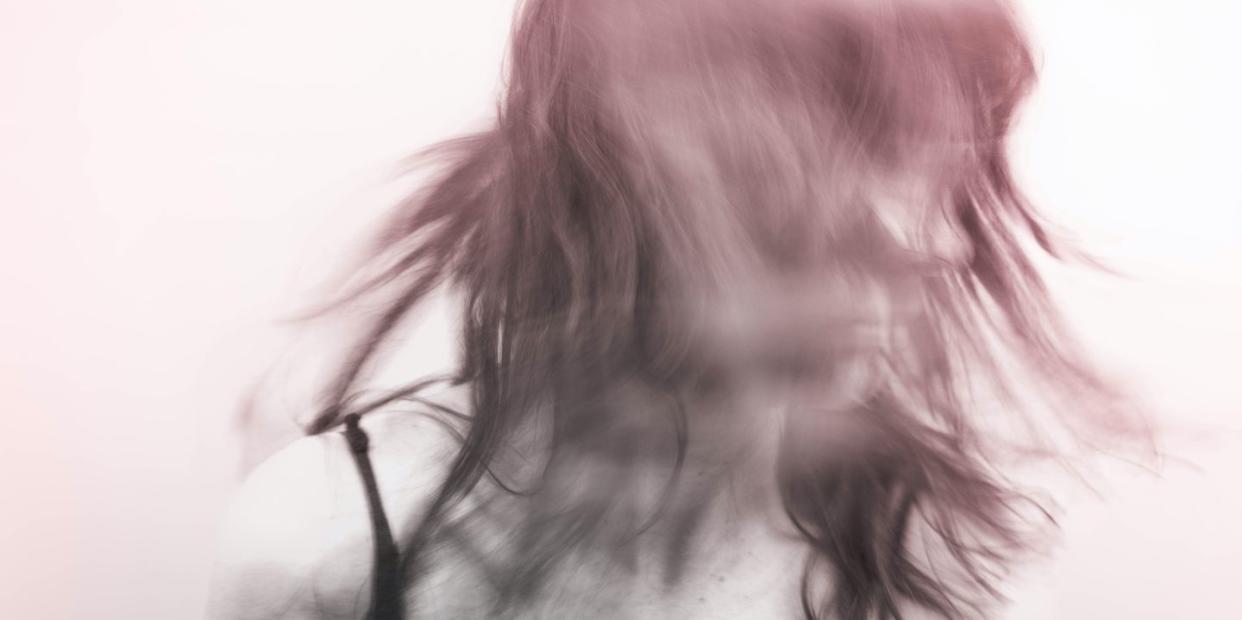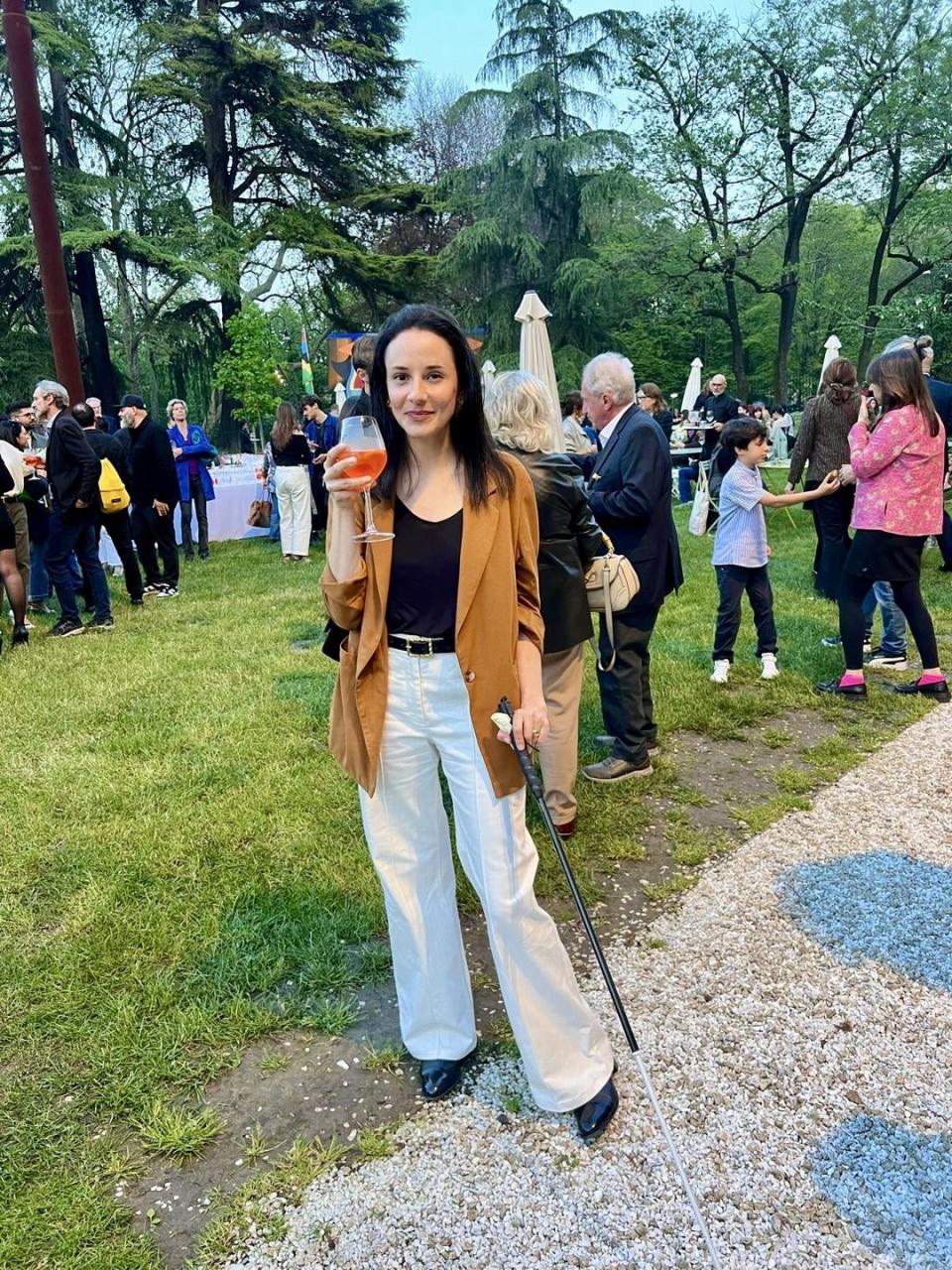When I could no longer hide my sight loss, dating changed forever

Like many girlies with a VPN and a Netflix account, I’m currently rewatching Sex and the City. And the further I get into the series, the more obvious it becomes that – problematic moments aside – conversations around dating and relationships haven’t really changed that much over the last 25 years. From dating exhaustion (which has now morphed into dating app burnout) to egg freezing to finding love, the gals lived through it all, and so are we.
One thing Carrie, Miranda, Charlotte, and Samantha don’t cover during their cosmo-infused girl-talk, however, is dating when you have a disability. Sure they can rock a pair of Manolos and Fendi Baguettes, but could they rock a cane?
Enter moi, a 37-year-old fashion lover with a significant visual impairment. I was born with a genetic condition that causes gradual sight loss and recently had to start using a cane, which, believe me, is a major transition to have to go through. As I start thinking about getting back into the dating game P.C. (post-cane), I can’t help but wonder: Do men only see the cane? Can they look past it and see the woman behind the disability?
Recent conversations on TikTok haven’t left me too hopeful. Last month, a viral video showed three male podcasters debating whether they’d stay with their partner if they were to become disabled. Although many people criticised both the subject of the debate, as well as the language used by the men – “If your girlfriend was hit by a car and she was completely mangled, would you stay with her?” – this isn’t the only discussion about ableism in dating on TikTok. In the last few months, people have also taken to sharing the messages they get on dating apps, and it ain’t pretty. One notable example is a Grindr message sent to disabled creator Spencer West, which reads, ‘Wow you’re so inspiring and brave for being on here’. “The subtext of that,” says West in a video sharing the conversation, “is, ‘Wow if I was in your position, I would just give up on life, let alone love’.”
While I haven’t been on the receiving end of these kinds of ableist messages (yet), I find it deeply disturbing to see how many people seemingly feel emboldened to be openly ableist both publicly online and in private dating app conversations – something that made me nervous when, cane in hand, I returned to the world of dating.
A cane – or any disability-related aid for that matter – is a heavily loaded and stigmatised symbol within our society. Why? Because it’s perceived as equating weakness, victimhood, and dependency – not the sexiest attributes. And while my mission in life is to show a different side of disability in the hopes of smashing these age-old, ableist stereotypes, I’ve found that I’ve had to battle my own, deeply ingrained ableist behaviour as well.
For example, consciously or unconsciously, aesthetics have become much more important to me since I started using a cane. As my disability became more visible, I began laying extra claim to certain parts of my identity as a woman – becoming more feminine, polished, elegant – as if I somehow needed to counterbalance the visibility of my disability. It’s as if I’m trying to say, ‘Yes I have a cane, but look how pretty and stylish I am!’. Why do I feel like I need to overcompensate? Why do I think that a cane makes me less attractive or desirable?
Aside from the mental and emotional prep I’m going through vis-à-vis dating, one major thing that’s holding me back is my diminished ability to be spontaneous. I can’t just wander freely into a museum and have a meet-cute moment with a guy, because every outing needs to be planned and organised, with any date either picking me up or meeting me in front of a very specific place where an Uber can easily drop me off. I can’t just sit down in a pub after a long day’s work in the hopes of engaging in subtle, visual flirtation cues – like eye contact or reciprocal smiling – because I can’t see anything in dimly-lit places. And if I am set up on a blind date (no pun intended), I need to ask that complete stranger to help me navigate, find my seat, and read the menu. Logistics and accessibility needs aren’t sexy on a first date, and, in my experience, men tend to disengage from anything that sounds or feels too complicated.

Still, I need to signal to the universe that I am indeed ready to start dating again and so I recently – but very reluctantly – created a profile on Raya, where I very clearly show and state that I am visually impaired. Yes, I’ve gotten some matches and messages, but none that really excite me (sorry, guys). Besides, I’m not sure how long I’ll stay on the apps; partly out of boredom, but partly because I’m nervous about being on the wrong side of TikTok’s horrendous dating stories.
What does help me feel positive, though, is the rise in disabled love stories on screen – be it Maeve and Isaac’s relationship in Netflix’s Sex Education, Micah and Maribel’s revolutionary sex scene in The L Word: Generation Q, or the whole of the recent BBC drama, Then Barbara Met Alan. We’ve still got a long way to go, but, like any movement that shakes up the status quo, improving representation and countering ableism (on dating apps and beyond) will take time.
For my part, I’m making it my mission to show to the world that canes are just another accessory – and I feel pretty damn sexy owning that.
You Might Also Like

 Yahoo Lifestyle
Yahoo Lifestyle 
